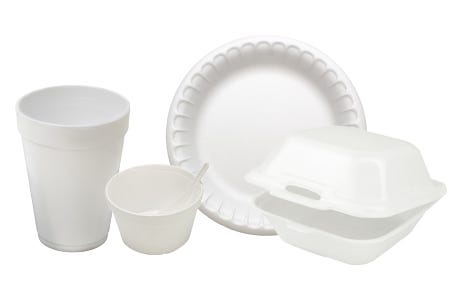New York City Mayor Bill de Blasio announced on Thursday a citywide ban on expanded polystyrene (EPS) foam containers and packing peanuts, which will go into effect on July 2015. EPS is already banned in cities across the country, including Washington, DC, Minneapolis, San Francisco, Oakland, Portland, Albany and Seattle.
January 8, 2015
In a news release, the mayor's office mentioned that foam manufacturer Dart Container Corp. was among the many companies it consulted with regarding this issue. Dart had offered to help the city expand its recycling program to include foam packaging, which included foodservice and protective packaging.
"These products cause real environmental harm and have no place in New York City. We have better options, better alternatives, and if more cities across the country follow our lead and institute similar bans, those alternatives will soon become more plentiful and will cost less," said Mayor Bill de Blasio. "By removing nearly 30,000 tons of expanded polystyrene waste from our landfills, streets and waterways, today's announcement is a major step towards our goal of a greener, greater New York City."
The Department of Sanitation (DSNY) determined that "EPS foam cannot be recycled, which is what led to the ban." DSNY also determined that there currently is no market for post-consumer EPS collected in a curbside metal, glass, and plastic recycling program. As a result of the ban, manufacturers and stores may not sell or offer single-use foam items such as cups, plates, trays, or clamshell containers in the city. The sale of polystyrene loose fill packaging, such as "packing peanuts" is also banned.
The law allows businesses a six-month grace period from when the law goes into effect - January 1, 2016 - before fines can be imposed. For the first year of the ban, businesses will be given a warning in lieu of a fine.
In accordance with the city's new policy, the Department of Education will begin replacing foam trays with compostable plates on May 1st. All school meals will be served on these compostable plates starting in September.
"For too long polystyrene foam has been mischaracterized as a safe, and economically sound choice for packaging when it is in fact a great threat to the city's ecosystem and our commitment to environmental sustainability," said Council Member Donovan Richards, chair to the Committee on Environmental Protection. "I applaud the mayoral administration's decision to finally ban the use of plastic foam, and look forward to the widespread use of renewable and recyclable materials for packaging."
Shortly after the announcement was made, Mike Levy, senior director for the American Chemistry Council's Plastics Foodservice Packaging Group, released the following statement:
"We are puzzled by the city's decision to continue sending alternative foodservice and foam packaging to landfills instead of saving money by recycling foam at curbside. New York City could have surpassed Los Angeles as the largest city to recycle foam packaging at curbside, building on the experience of existing curbside recycling programs in other cities. Based on New York City's decision, residents will not be able to recycle any foam packaging - meat trays, egg cartons, protective packaging, foam cups - at curbside, and the use of foam foodservice packaging will be restricted. This will neither increase recycling nor reduce litter."
In addition, Levy said that restrictions on foam foodservice packaging also will harm the area economy. In New York State alone, four foam foodservice packaging companies with nine facilities employ 1,563 people and contribute $47.5 million in payroll and pay $2.3 million in state taxes.
"We encourage the city to reconsider this decision and pursue readily available opportunities to recycle foam packaging," he said.
About the Author(s)
You May Also Like


